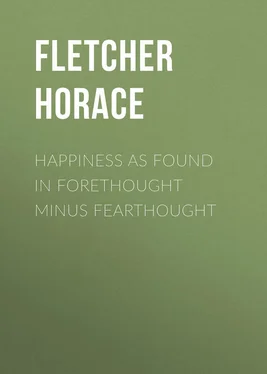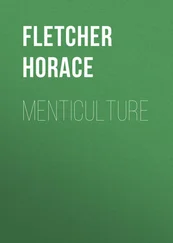Horace Fletcher - Happiness as Found in Forethought Minus Fearthought
Здесь есть возможность читать онлайн «Horace Fletcher - Happiness as Found in Forethought Minus Fearthought» — ознакомительный отрывок электронной книги совершенно бесплатно, а после прочтения отрывка купить полную версию. В некоторых случаях можно слушать аудио, скачать через торрент в формате fb2 и присутствует краткое содержание. Жанр: foreign_antique, foreign_prose, на английском языке. Описание произведения, (предисловие) а так же отзывы посетителей доступны на портале библиотеки ЛибКат.
- Название:Happiness as Found in Forethought Minus Fearthought
- Автор:
- Жанр:
- Год:неизвестен
- ISBN:нет данных
- Рейтинг книги:3 / 5. Голосов: 1
-
Избранное:Добавить в избранное
- Отзывы:
-
Ваша оценка:
- 60
- 1
- 2
- 3
- 4
- 5
Happiness as Found in Forethought Minus Fearthought: краткое содержание, описание и аннотация
Предлагаем к чтению аннотацию, описание, краткое содержание или предисловие (зависит от того, что написал сам автор книги «Happiness as Found in Forethought Minus Fearthought»). Если вы не нашли необходимую информацию о книге — напишите в комментариях, мы постараемся отыскать её.
Happiness as Found in Forethought Minus Fearthought — читать онлайн ознакомительный отрывок
Ниже представлен текст книги, разбитый по страницам. Система сохранения места последней прочитанной страницы, позволяет с удобством читать онлайн бесплатно книгу «Happiness as Found in Forethought Minus Fearthought», без необходимости каждый раз заново искать на чём Вы остановились. Поставьте закладку, и сможете в любой момент перейти на страницу, на которой закончили чтение.
Интервал:
Закладка:
The birth of the body of man is accomplished when it attains consciousness of its physical requirements.
The birth of the soul of man is accomplished when he attains consciousness of what is good, of what his functions and duties are relative to his own best growth, and also relative to his uses and duties as a member of society.
Man is not fully born until his mind is conscious of his body and conscious of his soul, and knows the functions and duties of each relative to the best growth.
Until man is fully born, as described above, the responsibility of his perfection or imperfection rests with his teachers and their teachings.
Everything that man is conscious of is his teacher.
You are the teacher of every person who sees or is otherwise conscious of you or of your example.
It is unmanly, and especially unchristian, not to seek the greatest possible enlightenment relative to the functions and duties in growth, not only for your own sake, but as an example for others; and, being enlightened, not to do all possible to assist growth.
Whoever reads and assents to the above, takes upon himself the responsibility of his future growth, and will be respectable or not-respectable insofar as he seeks enlightenment and assists growth, or neglects to seek enlightenment and thereby retards growth.
Happiness, the evidence, fruit and reward of growth, rests in self-respect first, and, incidentally, in the measure of respect held by others.
No one is respectable who is not doing his best .
When a man finds fault with the material with which he has been furnished – with his form, with his face, with his mind, with his muscle, with his equipment of wealth, or other means or tools of growth, at the time of his being fully born, he puts blame upon, and thereby blasphemes, his Creator, as well as discredits his progenitors.
Whoever reads, and assents to, the foregoing is fully born, in that he has learned and now knows what is best . The question then is: "What will he do with it?"
In highly-civilized life it is not-respectable not to be fully born .
The fully-born is not doing his best , and is therefore not-respectable when he suffers himself to retain or cultivate the habit-of-fearthought .
The fully-born is not doing his best , and therefore is not-respectable, when he entertains and nurses worry .
The fully-born is doing his worst when he allows himself to be angry .
The fully-born is unmanly, especially unchristian and altogether not-respectable when he is not doing his best, and is always a subject for pity, and frequently a subject for contempt, when he is doing his worst.
The fully-born-and-entirely-respectable individual knows that fearthought is an unprofitable element of forethought, knows that it can be eliminated from the habit-of-feeling by persistent, intelligent habit-of-thought, and, knowing this, prepares the field of his mind for unhampered growth by eradicating all of the expressions of fearthought, as well as all other deterrents to growth.
The fully-born-and-entirely-respectable individual is the one to whom come health, strength, memory, inspiration, love, preferment, altruistic impulses, and the appreciation necessary to find the greatest enjoyment in them all.
The fully-born-and-entirely-respectable individual needs not symmetry of form nor beauty of face nor accumulation of wealth to make him happy, for the light from within will give grace to his form, reflect beauty from his face, and attract all of the things that constitute wealth.
The fully-born-and-entirely-respectable condition is the condition that is easier than not, pleasanter than any, and in which only true happiness dwells.
Out of the fully-born-and-entirely-respectable habit-of-being and habit-of-thinking, nursed within our professedly-altruistic organizations, will the impulse spring which will so shape conditions that unhappiness can no longer exist, except as the result of perversity.
PREFATORY DEFINITIONS
Much misunderstanding arises from the various interpretations of the meaning of terms. So different are the interpretations given to some words, that a large part of the dictionaries is taken up with synonyms whose varied applications are nearly as wide apart as the limits of the greatest misunderstanding.
Many of these different applications of words are the result of corruptions of the original meaning, but they are none the less misleading, and furnish an excuse for agreeing on specific definitions.
As an example of corrupt uses given to words that should be held to convey only a sacred meaning, take the word "love," as promiscuously applied, for instance. It should be removed from all selfishness, and attach only to such holy application as that implied by the expression, "God is Love." In its application to individuals, as in mother-love, child-love, love between husband and wife, or between brothers, it should only have spiritual significance, unalloyed by any suggestion of liking, approval, desire, or lust; and should even extend its mantle to spread alike over all created things.
Love had already been so corrupted in its uses in the time of Comte, that he was impelled to coin a new word to express unselfishness between brother-men, and hence gave the word "altruism" – (other-self) – to the world.
"Altruism," also, in its turn, has suffered by contact with the selfish habit-of-thought of the present time, until it does not longer express the highest quality of love – the spiritual – but rather the socio-commercial quality that seeks and expects reward of praise or material emolument.
Although it is some time since "altruism" was first used – and it is a word of most important meaning to sociology – there are few who can define it.
Probably the material rush of the time has allowed little opportunity for acquaintance with it. It is rarely seen in the magazines, and almost never in the daily papers. This is probably the reason why the author was able to find only three, out of thirty persons asked, who could define "altruism." These thirty were met haphazard, and represented a fair average of city intelligence. It follows, by inference, that there is not as much altruism as there should be in existence among us, for, if there were, the word chosen by Comte to express it would be more widely used and known.
In presenting a set of definitions, there is no intention of calling into question the intelligence of any reader. The idea was suggested by the wide difference of understanding of the meaning of the word "worry." This difference of understanding became apparent in the discussion of Menticulture . 1 1 Menticulture is the title of a book by the present author, whose mission is to declare a theory of the possible and very profitable eradication of the germs of all evil, and consequent unhappiness, which are commonly assembled under the class names of "anger" and "worry", – "anger" representing the aggressive, and "worry" representing the cowardly passions.
It was found that many persons defined "worry" as "any consideration of the future," whereas only apprehensive consideration of the future was intended to be meant by its use in Menticulture .
Reference to the origin of the word revealed that it was first used to express the "barking of a small dog," probably in contradistinction to the biting of a large dog. It was first "worrit," and became "worry," as now, later on. "Picking" and "nagging" were its synonyms in slang until they were taken into the language as sober expressions.
In the attempt to separate "worry"
from "forethought," the word "fearthought" was coined, and hence our present title, and also the definitions hereunder, whose object is to render misunderstanding as nearly impossible as possible.
Читать дальшеИнтервал:
Закладка:
Похожие книги на «Happiness as Found in Forethought Minus Fearthought»
Представляем Вашему вниманию похожие книги на «Happiness as Found in Forethought Minus Fearthought» списком для выбора. Мы отобрали схожую по названию и смыслу литературу в надежде предоставить читателям больше вариантов отыскать новые, интересные, ещё непрочитанные произведения.
Обсуждение, отзывы о книге «Happiness as Found in Forethought Minus Fearthought» и просто собственные мнения читателей. Оставьте ваши комментарии, напишите, что Вы думаете о произведении, его смысле или главных героях. Укажите что конкретно понравилось, а что нет, и почему Вы так считаете.












